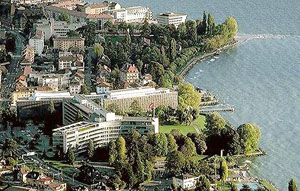Henri Nestlé
Home > Tourist Guide > Table of contents > Lake Geneva > Vevey > Henri Nestlé

Nestlé Headquarters in Vevey. (©_Switzerland Tourism) |
|
|
Henri Nestlé was born in Frankfurt in 1814, and moved to Vevey in
his twenties, a merchant and small-scale inventor. He slowly gravitated
towards foods and foodstuffs, experimenting with various recipes for
baby-food to help mothers who were unable to breastfeed, and eventually
came up with a concoction he called farine lactée, based, as he
put it, on “wholesome Swiss milk and a cereal component baked by a
special process of my invention”. In 1867, he fed this to a premature
baby boy whose mother was dangerously ill herself; the boy survived, and Nestlé’s reputation skyrocketed. The following year he opened an office
in London to cope with the quantity of orders, and within five years was
exporting to South America and Australia. In 1874 he sold his company for
a million francs. Nestlé bought out Anglo-Swiss Condensed Milk in 1905,
and chocolatemakers Peter, Cailler and Kohler – pioneers in making milk
chocolate – in 1929; although it had always concentrated on milk alone,
it started to diversify. Benefiting from massive surpluses of coffee
beans in the 1930s, Nestlé launched the world’s first instant coffee – Nescafé – in 1938. More takeovers followed, of processed-food
manufacturer Maggi in 1947, Crosse & Blackwell in 1950, and
frozen-food giant Findus in 1963, broadening the range even further. By
the mid-1960s, Nestlé was Switzerland‘s biggest company, a huge
multinational incorporating over 200 factories around the world, with
global management still based in Vevey.
Today, having swallowed up cosmetic company L’Oréal in 1974 and British
confectioner Rowntree’s in 1991, Nestlé employs almost a quarter of a
million people, and buys up more than ten percent of the world’s entire
crop of coffee and cacao beans. However, its most controversial product
is, strangely, its original one: baby formula. With a marketing policy in
developing-world countries that has been deemed by many to be
aggressively profit driven at the expense of consumer health, Nestlé has
been riding a storm of anger in recent years from children’s
organizations and health watchdogs in both the developed and the
developing world. Many of these groups continue to lobby for boycotts of
Nestlé products unless the company takes a role in helping educate
mothers in developing-world countries to breastfeed whenever possible,
and to buy formula only as a last resort. The company maintains its ads
don’t dissuade mothers from breastfeeding, and are merely offering them a
choice. The dispute shows few signs of resolution and, frankly, little
chance of toppling such a mighty global industrial entity as Nestlé. |